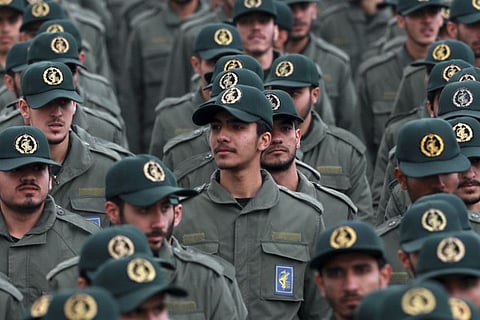All eyes on Tehran after latest US moves
Trump’s decision to designate IRGC a terror outfit has set things in motion

The latest move by US President Donald Trump and his administration against Tehran, regarding the designation of Iran’s Islamic Revolutionary Guard Corps (IRGC) as a terrorist organisation, drew almost-unanimous comments, articles and analyses by so-called Iran experts that US military assets across the Middle East were in serious danger of IRGC retaliation.
The first reaction from Tehran to the US move came from former IRGC commander Mohammad Ali Jafari, who said that American forces in the region will no longer have “their ease and serenity”, implying that Iran would target American forces.
The burning question, as Trump and the Iran hawks in his administration pursue the “maximum pressure” campaign on Iran, is: will Iranians take any retaliatory action that could result in a military confrontation with the US? A look at history might help us find an answer to this question.
When Iraq invaded Iran in 1980, the United States supported Iraqi leader Saddam Hussain against the two countries’ mutual enemy: Iran. The war dragged on for eight years. On July 3, 1988, Iran Air Flight 655, strangely enough, mistakenly identified as a fighter, was downed by the American Navy and 290 passengers and crew members on board were killed.
The government of Iran issued statements threatening retaliation against American personnel and interests. Meanwhile, immediately after, Ayatollah Hussain Ali Montazeri, who at the time was the designated successor of Ayatollah Khomeini, wrote Khomeini a letter asking him to declare [war] against the US. In response, Ayatollah Khomeini wrote, “Your message was a relief to the pains of all who have been victimised by the Great Satan. … You are one of the precious members of this revolution … Dedicate your time to building a world filled with chivalry and generosity.”
Two weeks later, Iran accepted the truce with Iraq, while observers almost unanimously expected an escalation in the region between Iran and the US Navy. A former Iranian president, the late Akbar Hashemi Rafsanjani, later said in an interview, “Until the incident of the shooting of the passenger plane by the US, there was no discussion about accepting UN Resolution 598 whatsoever (urging an Iran-Iraq ceasefire).”
Iran’s offer
During the presidency of George W. Bush, while his neo-conservative administration took the toughest stance against Tehran to that point and the two countries were engaged in a war of words, suddenly Iran, informally through Swiss ambassador to Tehran Tim Guldimann, offered the US a grand bargain to solve the two countries’ disputes on all fronts. The offer was turned down by the Bush administration.
Another example is Ayatollah Ali Khamenei, Iran’s leader, adopting a flexible approach in 2013 towards the United States. This stunned many inside and outside Iran. After years during which declared direct talks with Americans were prohibited, the new approach opened doors to dialogue at the highest levels and eventually led to the 2015 nuclear deal referred to as the Joint Comprehensive Plan of Action (JCPOA). Notably, the JCPOA crossed the red lines drawn by Khamenei almost in its entirety, as also noted by Khamenei. However, Iran accepted and signed it.
The starkest example is Iran’s decision to remain in the JCPOA so far, despite Trump’s withdrawal from the deal. Before Trump’s move, Khamenei said, “If the US tears up the JCPOA, we will set it on fire.”
The deep worldview behind all these inactions is clear: The survival of the nezam (establishment) is the number one priority. The approach has ideological roots, at least for Khamenei and the conservative-dominated deep state which follows Khomeini’s declarations as religious laws.
“This is a divine responsibility for everybody which is above all our duties to God: Keeping the Islamic Republic [of Iran] in place,” Khomeini had declared. The Iranian government, despite its radical position in words, will refrain from taking any action that could jeopardise its survival.
Iran is not likely to take any action, not now and not even later, unless it cannot sell oil anymore, cannot transfer foreign currency into the country, and cannot import essential goods. That is when the collapse of the system appears on the horizon and radical actions might appear to be a solution. The recent announcement by the White House to end exemptions from sanctions for countries (China, India, Japan, South Korea and Turkey) still buying oil from Iran is therefore a key move. We will have to wait and see how Tehran responds.
Shahir ShahidSaless is a political analyst and freelance journalist writing primarily about Iranian domestic and foreign affairs. He is also the co-author of Iran and the United States: An Insider’s View on the Failed Past and the Road to Peace.



